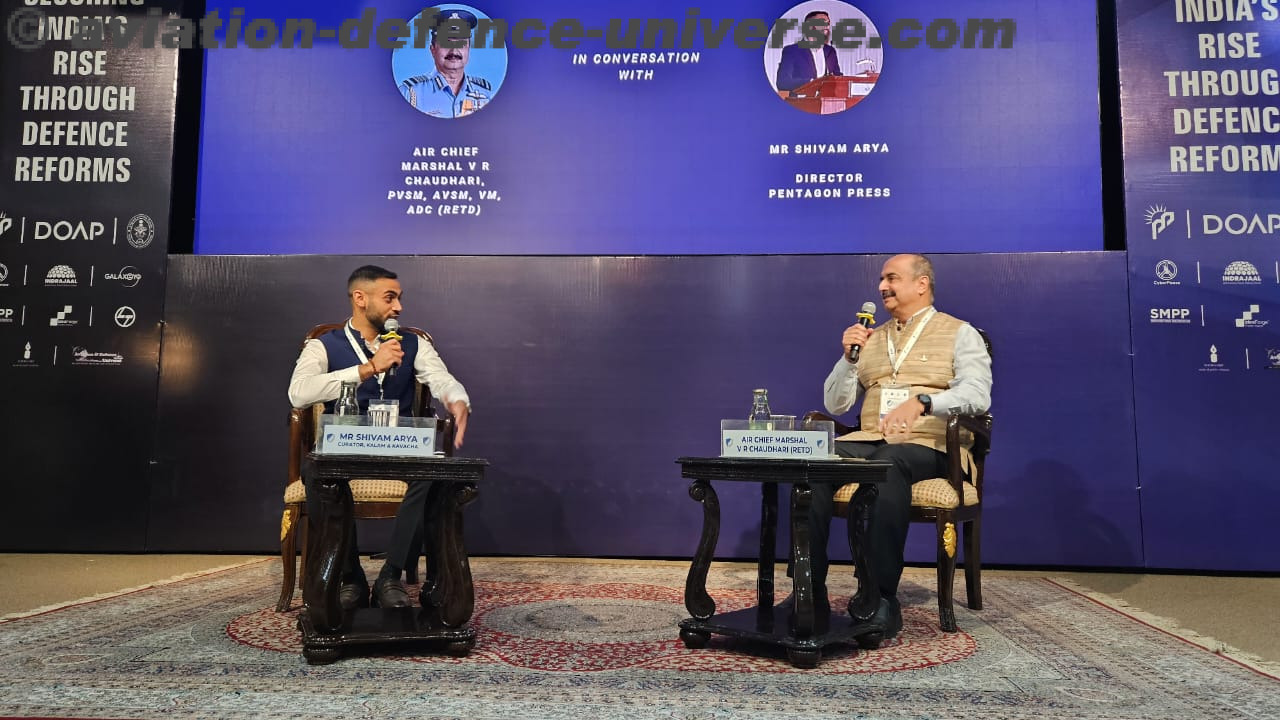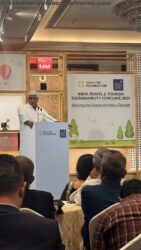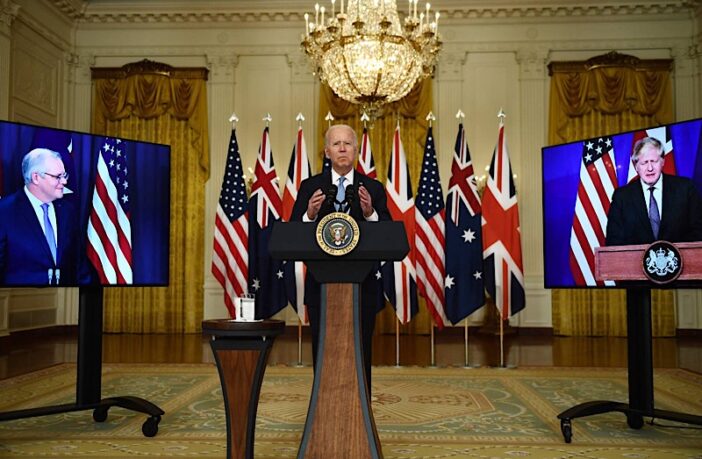
- September Surprise Shocks the World
By Commodore Anil Jai Singh, IN (Retd)

New Delhi. 20 September 2021. There is never a dull moment in the Indo-Pacific region. While most of August and the first half of September was dominated by the events in Afghanistan and their aftermath, the Australia-UK-USA trilateral called AUKUS , announced on 16 September took not only the world by surprise but also their allies and partners.
India which had concluded a 2+2 Ministerial meeting with Australia barely five days before that did not seem to have an inkling of this development taking place either from the 2+2 meeting or from the USA . Neither did Japan, the fourth member of the Quad and one of the USA’s closest allies. Surely, such a significant trilateral could not have happened overnight and must have been at least a few months in the making if not longer. The fact that it extended to Australia agreeing to build a fleet of nuclear powered attack submarines with support from the USA and the UK when, till just a few months ago the n-word was big no-no in that country, clearly indicates the depth of the discussions that would have preceded this announcement.
France has expressed it displeasure in no uncertain terms at this development because the decision to build eight nuclear-powered attack submarines has come at the expense of the existing programme to build 12 diesel-electric submarines in collaboration with the French company, Naval Group is being cancelled. Infact, President Macron has gone to the extent of taking the unprecedented step of recalling his Ambassadors to Washington and Canberra as France claims to have been stabbed in the back. This may seem a rather drastic and immature reaction to a cancelled commercial contract but is not entirely surprising because the French Government involves itself very deeply in promoting the export of French military hardware and it is not unusual to have senior French ministers and occasionally even the French President including it in their agenda in their interaction with potential customers.
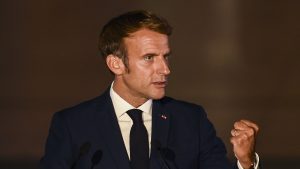
President’s Macron reaction is also surprising since he would definitely have been aware of the many contentious issues in the submarine programme. The initial contract for AUSD 50 Bn had skyrocketed to over AUSD 90 Bn and was still rising despite the construction of the submarines not having even begun. Australia was also discovering that some of the contractual obligations were not likely to be met including issues related to design and the Transfer of technology. Infact, the clamour for the cancellation of this contract had been building up for some time, both in the Australian Parliament as well as in the media. The Australian Prime Minister had also expressed is concerns on the progress. The delivery date was also slipping with the first boat likely to enter service only in the mid- 2030s and the last by 2050 or so.
In 2018, during his visit to Australia during which he discussed the hastening of the signing of the submarine contract amongst other matters of state, President Macron had suggested an Australia-France-India trilateral stating that “This new Paris-Delhi-Canberra axis is absolutely key for the region and our joint objectives in the Indian-Pacific region,” Building on this suggestion , the Foreign Ministers of the three countries met in London in May this year on the sidelines of the G7 Foreign Ministers meeting in which cooperation on a wide ranging gamut of activity was discussed and agreed upon.
From an Indo-Pacific maritime security perspective, the French displeasure is not a healthy development as it will bring to the fore the underlying issues related to a divergence in the USA’s and the EU’s approach to relations with China , France’s deep suspicions of an Anglo Saxon construct designed to keep it out of the picture and to a certain extent on the future of Europe’s relations with the USA in the wake of the UK’s exit from the European Union.
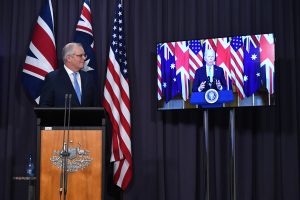
The Indo-Pacific is now the global economic and geopolitical centre of gravity. A Free and Open Indo-Pacific and the existing rules based international order is under direct threat from a rising China which has on more than one occasion indicated its contempt for existing conventions ( despite being a signatory) and its maritime belligerence in the waters of its interest is a matter of great concern not only to maritime security in the Pacific but increasingly in the Indian Ocean as well. This concern has led even Euro centric countries like Germany and the Netherlands to articulate their own Indo-Pacific strategies which are mainly focussed on ensuring a FOIP for the safe passage of their trade. France on the other hand a much larger stake in the region. It has always considered itself an integral part of the Indian Ocean maritime construct. It has a permanent naval presence in the Indian Ocean headed by a 2-star Admiral and is the first country in the world to appoint an Ambassador to the Indo-Pacific. 93% of France’s Exclusive Economic Zone lies in the Indo-Pacific and 1.5 million of its citizens live here. As the world turns increasingly to the oceans for its economic sustenance and the well-being of its citizenry, the importance of this region for France will increase exponentially. Hence, France with its large economy and sizable navy is a valuable partner amongst like-minded nations in the region. France has also been a reliable strategic partner for India and India too reciprocates the warmth of the relationship. Alienating France in this region is in nobody’s interest.
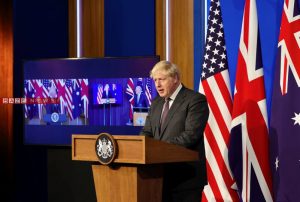
The UK’s naval presence in the Indo-Pacific is also a welcome development as it strengthens the maritime security structure in the region. The seven month deployment of a Carrier Task Force (CTF 21) led by the 65000 ton aircraft carrier Queen Elizabeth and the ‘tilt’ to the Indo-Pacific highlighted in the UK’s Integrated Review is a significant manifestation of Prime Minister Boris Johnson’s vision of a ‘Global Britain’. It is understood that the UK will permanently deploy two River class Offshore Patrol Vessels (OPVs) to the Indo-Pacific. The Integrated Review also highlights India as an important partner and the 10 Year Roadmap agreed to between Prime Ministers Modi and Johnson is aimed to build thus relationship which is often referred to as ‘underwhelming’.
The Quad has been steadily gaining traction in the security matrix of the Indo-Pacific. It has identified a wide scope of activities and objectives but its primary consideration remains a Free and Open Indo-Pacific and it is getting global support from like-minded nations equally concerned about the threat to the global commons from a rising and assertive China. Since the Quad is itself an informal grouping of four nations who do not seem to be in a hurry to institutionalise the arrangement , any expansion by adding more countries may be a bit premature at present even though it often figures in discussions. The Quad in its present form can be the fulcrum for like-minded nations to leverage their capabilities towards ensuring a FOIP and a rules-based order while checking China’s belligerence and keeping the dragon at bay in the region. Therefore, any rift at his stage based on a misunderstanding and will be seen as a vulnerability to be exploited. As it is, China considers democracy a weak form of governance.
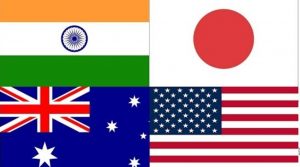
The forthcoming Quad Summit scheduled in Washington DC on 24th September when President Joe Biden will meet with Prime Ministers Modi, Morrison and Suga will also be part of his attempt to restore his image as a world leader after the fiasco of the Afghan withdrawal which is being compared to the ignominious exit of the US from Saigon almost half a century ago. He has also decided to address the UN General Assembly a day later. The agenda for the Summit includes most of the issues that have been discussed earlier related to maritime security, the Covid pandemic, the vaccination strategy, the importance of resilient supply chains, HADR etc and no surprises are expected. However, this should also be the occasion for clarifying many issues of concern which should not be glossed over if indeed the Quad is to be strengthened. India should flag at least the following two important issues.
The first is Afghanistan because of its implications for India’s security. The USA’s less than glorious withdrawal from Afghanistan and practically handing over the country to the Taliban while marginalising the democratically elected government has grave implications for the Indo-Pacific region and particularly so for India. A power vacuum has been created which China and its proxy Pakistan will be only too happy to fill. India could see a renewed thrust on cross border terrorism with the release of Al Qaeda and ISIS fighters by the Taliban and India’s investment in the developmental efforts in that country could also come to nought. India’s reluctance to engage with the Taliban puts it at a considerable disadvantage while it waits and watches the unfolding scenario in that country.

The formation of AUKUS and its implications in the Indo-Pacific must also be clarified. The French displeasure, whether justified or not must be addressed to avoid the resurfacing of fault lines which have lain buried for many years. From an Indian perspective, France is a highly valued strategic partner. It is one of the few in the region focussing greater attention on the Indian Ocean than on the Pacific. It stood by India when the entire western world including the US and the UK had imposed sanctions following the nuclear tests of 1998. India must take the initiative to bridge the developing rift or at least ensure that it is discussed and to dispel the inherent French suspicion of an Anglo-Saxon tilt in the region.
This is the second Quad Summit at the behest of President Biden in a little over six months and within the first year of his presidency; the first was held virtually on 12 March 2021. In between there have been many high-level visits also to the region. In the midst of the Afghan imbroglio, Vice President Kamala Harris visited Singapore and Vietnam. These visits were an indication of the USA’s commitment to the region and its allies and partners there. A robust US naval presence supported by the presence of like-minded regional and extra-regional navies in the western Pacific and the Indian Ocean is essential for maintaining a Free and Open Indo-Pacific and checking the ambitious plans of the PLA Navy to dominate these waters. It is hoped that the successful outcome of the Summit will go a long way in ensuring that.
The author Commodore AJ Singh is an ex-submariner of the Indian Navy and a defence expert. He is the Vice President at Indian Maritime Foundation. The views in the article are solely the author’s. He can be contacted at editor.adu@gmail.com












